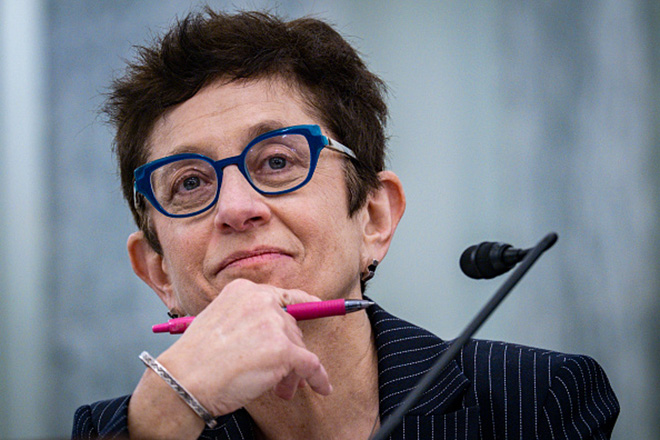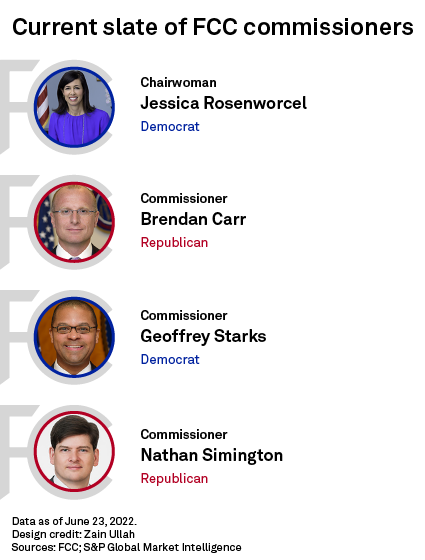S&P Global Offerings
Featured Topics
Featured Products
Events
S&P Global Offerings
Featured Topics
Featured Products
Events
S&P Global Offerings
Featured Topics
Featured Products
Events
Banking & Capital Markets
Economy & Finance
Energy Transition & Sustainability
Technology & Innovation
Podcasts & Newsletters
Banking & Capital Markets
Economy & Finance
Energy Transition & Sustainability
Technology & Innovation
Podcasts & Newsletters
S&P Global Offerings
Featured Topics
Featured Products
Events
24 Jun, 2022

| FCC nominee Gigi Sohn has faced a mix of poor timing, bad luck and opposition from some lawmakers, making her confirmation at once more urgent but also less likely with each passing day. Source: Pool/Getty Images News via Getty Images |
Time is not on the side of Gigi Sohn, the White House's embattled pick for the open seat on the Federal Communications Commission.
Tapped in October of last year to help carry out the Biden administration's broadband policy agenda, Sohn has faced two Senate hearings that examined her social media activity and her recusals from key FCC business items. While public interest groups and industry authorities on both sides of the aisle support her, a mix of poor timing, bad luck and opposition from some lawmakers and industry players has elongated the process to a point where her confirmation becomes less likely with each passing day, sources say.
"All indications suggest that it's over and [the White House] is just figuring out how to move forward with a different pick," a former FCC official told S&P Global Market Intelligence, requesting anonymity due to knowledge of Senate proceedings.
Yea or nay
The former FCC official pointed to a handful of Democratic senators who have either publicly or privately indicated they are ambivalent on Sohn.
Those senators include moderate Joe Manchin of West Virginia; Arizona's Mark Kelly and Kyrsten Sinema; Maggie Hassan of New Hampshire; Catherine Cortez Masto of Nevada; and Jon Tester of Montana.
In a divided Congress, all 50 votes from a party are generally needed to pass disputed nominations.
The offices of Manchin, Kelly, Hassan, Masto and Tester did not respond to a request for comment, though Manchin's office has told other outlets he remains undecided and Kelly has similarly said he is evaluating Sohn's record.
Sinema's office told Market Intelligence that Sinema voted in favor of the FCC nominee in the Senate Commerce Committee but did not add details about her intentions for the confirmation vote. A spokesperson did not respond when asked for clarification.
Timing is everything
It has been more than 500 days since the five-seat FCC had a full slate of commissioners. Even for those who support Sohn's confirmation, the delay in voting is proving worrisome given the congressional calendar.
"The problem is that if Gigi Sohn is not confirmed before the break for August, then I think it's real to project that the FCC may never have full staffing," said Ernesto Falcon, policy counsel at the Electronic Frontier Foundation.
Falcon is disappointed the Biden White House named broadband competition as a major policy priority but then delayed in choosing an FCC nominee. Though the seat became open in January 2021, Sohn's nomination did not come until October of that year.
 |
Top of mind
Myriad national political matters have added up over the past six months to stifle chances of a Sohn vote, said Rob McDowell, a former Republican FCC commissioner.
These matters include debates around gun control, abortion rights, gas prices, inflation, the pandemic, federal spending and the ongoing war in Ukraine. "Those are still the top issues," McDowell said. "And FCC commissioners start to become lower priorities."
In hindsight, the White House should have acted sooner, Falcon said. McDowell said the administration should have better considered the sensitivity of an evenly split Senate.
Senate Commerce Chair Maria Cantwell, D-Wash., told Market Intelligence in late April that the Senate floor schedule was serving as a holdup for Sohn's vote. Cantwell added that Sohn was "still meeting with people" but did not disclose further details of those meetings.
Some believe Senate Majority Leader Chuck Schumer, D-N.Y., is hesitant to schedule a vote for a nominee unless Schumer is sure that nominee will be confirmed. Only 55% of President Joe Biden's nominations were confirmed in the president's first year in office, according to the Partnership for Public Service Center for Presidential Transition.
Schumer's office did not respond to a request for comment.
What's at stake
The Biden White House wants net neutrality protections restored at the FCC, which would require a 3-2 Democratic majority at the commission. Consumer protection proponents note that other critical matters before the commission will require a similar majority.
Namely, the FCC must vote to approve the broadband maps that will guide the National Telecommunications and Information Administration's distribution of broadband deployment dollars under the $1 trillion infrastructure package, said Greg Guice, head of Public Knowledge's public affairs team. He believes approval may need a 3-2 majority due to contention surrounding the funding for the NTIA's Broadband Equity, Access and Deployment program.
If the commission is deadlocked when it comes to approving the maps, "People are going to be demanding that there'd be a fifth commissioner there to break that vote," Guice said.
Sohn co-founded Public Knowledge and was its CEO from 2001 to 2013.
Beyond net neutrality and broadband maps, the Biden FCC may need a majority to adopt formal digital discrimination prohibitions, Falcon said. The commission in March 2022 launched an inquiry into digital discrimination, where some ISPs might decline to build out broadband in certain American communities based on race, income and other factors.
McDowell, citing his time at the FCC when only three commissioners were present at one point, said the 2-2 agency can still tackle bipartisan business matters including national security risks and fueling the spectrum pipeline for 5G and eventually 6G connectivity.
Still, the broadband public interest community is concerned.
"I do not think there has been a sufficient case made by the White House to the Democratic caucus to explain the stakes here," Falcon of EFF said. "I think it is Gigi or bust in terms of having a governing FCC."

